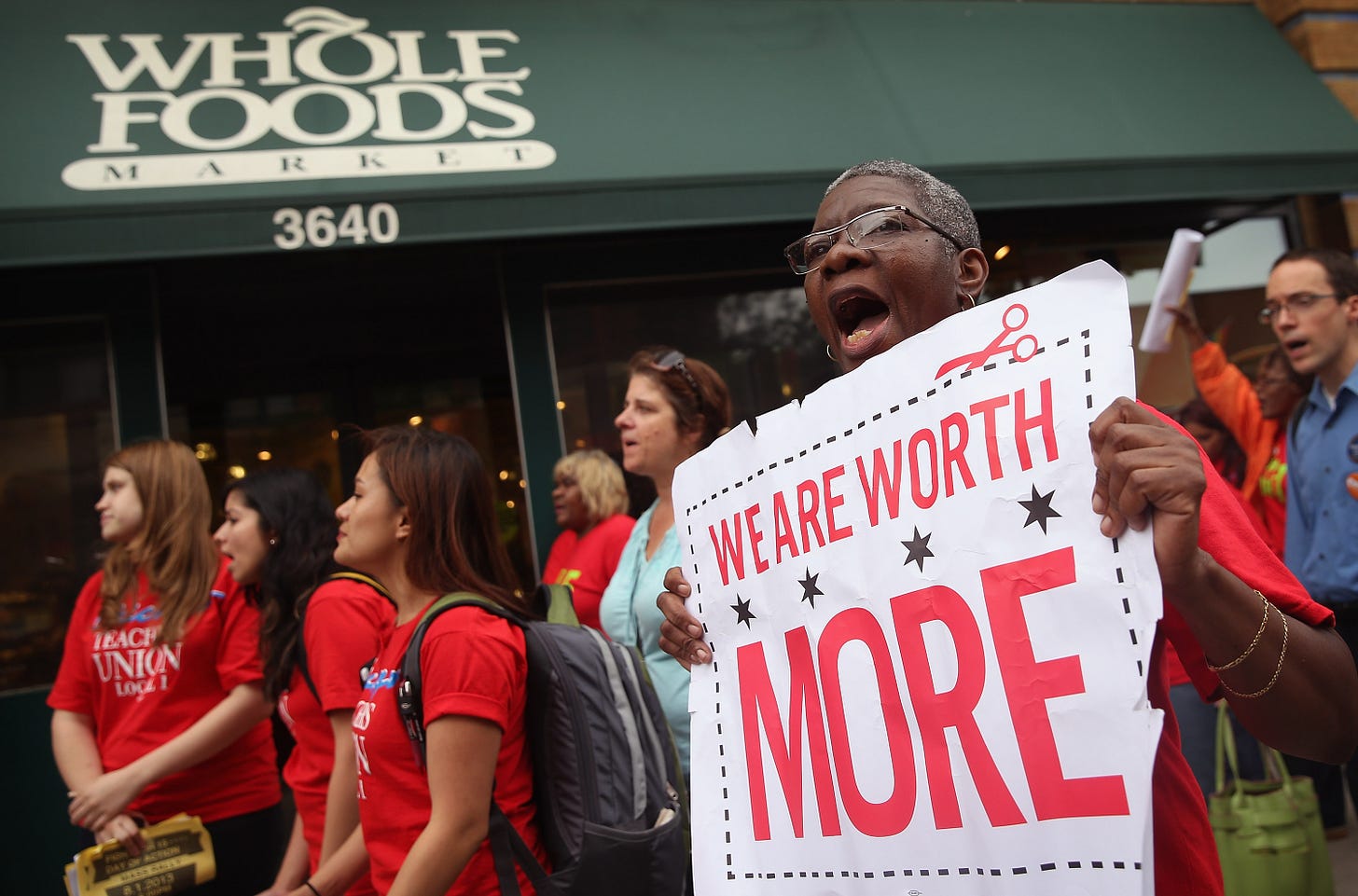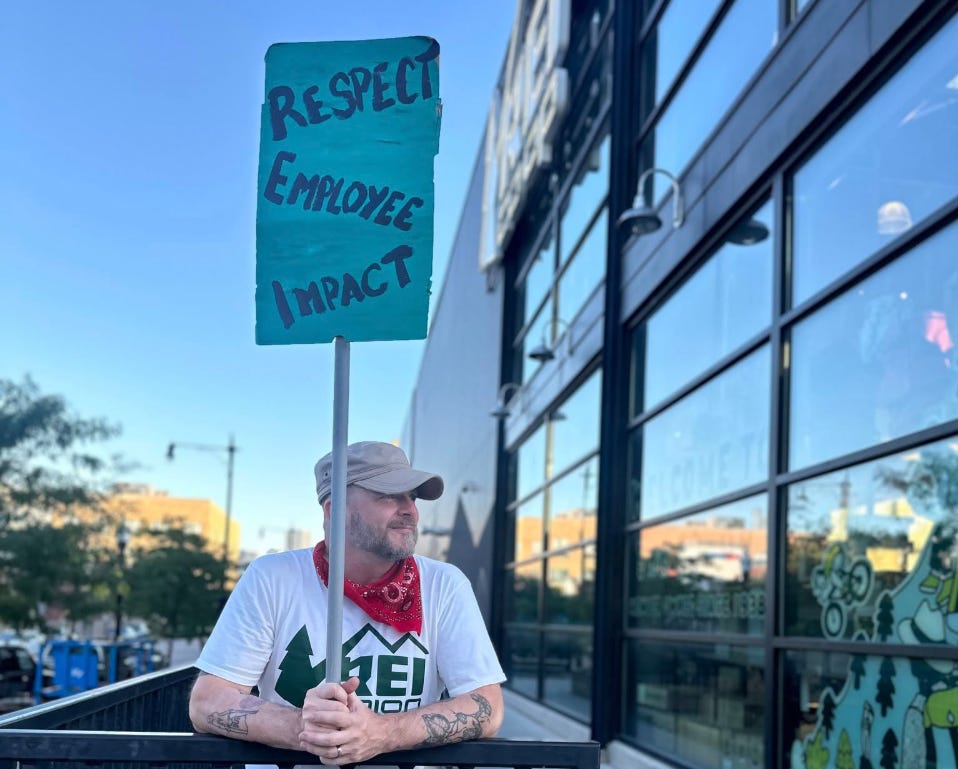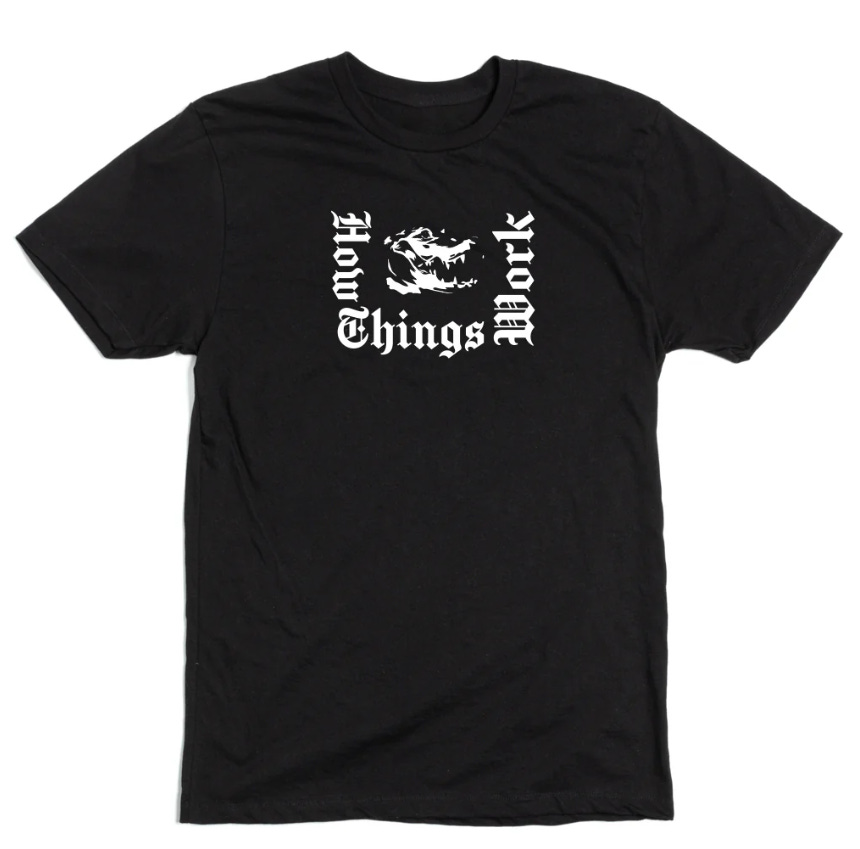Infinite Contempt For Working People Is Not an Acceptable Default Position
Judge corporations more harshly.
Corporations are granted many advantages in America that have allowed them to amass great wealth and power for their executives and shareholders. Some of these advantages are codified on paper: Favorable regulations, favorable tax laws, the ability to be treated as persons for the sake of political donations, and so on. The organized fight against “corporate power” tends to be a fight that focuses on changing these legal and regulatory and economic provisions, a formal battle waged in courts and legislatures.
Those fights, unless you are personally involved in an organization waging them, can seem remote from everyday experience. There is another significant advantage granted to corporations, however, that we all have the power to withdraw. That is the advantage of our own acceptance of their sociopathic nature. We offer them—often without thinking about it—our implicit approval of their operations, by treating them as good corporate citizens to be respected as upstanding members of a business community, rather than as contemptible bullies who have chosen to exploit our own human community members in outrageous ways.
Our approval? Our decision to grant companies the right to operate in our neighborhoods and cities and social and professional circles without being denounced? Companies don’t even pay for that advantage. We give them that one for free.
Why do I cast the average corporation—employers! Bestowers of life-giving healthcare coverage!—in such harsh terms? Because, as someone who writes about labor issues, I have become aware of the fact that we accept from these companies a sort of hostile, mean behavior towards their own employees that we would never tolerate if companies were, in fact, people, as the legal fiction claims. Major corporations spend huge sums of money on advertising and public relations to give themselves the warm halo of entities that have human personalities, and yet they act towards their own workers—their valued team members, who are their highest priority, etcetera!—in a bestial way that is a rejection of the most basic form of shared humanity. The ability to convince the general public that the standards of common decency that we all expect from one another do not apply to the entire field of business is one of the greatest tricks capitalism ever pulled.
I am not talking about surface-level things—the words in employee training manuals, the appearance of the uniforms, the quality of snacks that the boss chooses to provide in the break room. I’m talking about the baseline decision by a company to refuse to treat its workers as humans who deserve the sort of rights and respect that the executives of a company would expect for themselves. “Act in such a way that you treat humanity, whether in your own person or in the person of any other, never merely as a means to an end, but always at the same time as an end,” said Immanuel Kant. “We refuse to recognize your request for a union,” said corporate America.
Where workers are powerless individuals desperate for survival, exploitation is often dismissed as just the nature of reality. The inhumanity of corporate behavior is revealed in their treatment of unions. What is a union? A union is your employees. That’s it. It is your employees, all together in a group. That’s all. A company that claims to value and respect its employees but fights against their legal right to unionize and negotiate collectively in good faith is simply lying. You cannot claim to respect people and then act utterly disrespectful towards the same people when they are in a group. Unions are the thing that force companies to reveal their omnipresent barbarity towards their workers. It exists at all times, but the process of workers trying to exercise their rights to act collectively makes their employers lay their brutal cards on the table.
Whole Foods. The nice grocery store that loves organic food and cares about your baby eating the best kind of yogurt. In January, Whole Foods workers in Philadelphia voted to form the first union in the company’s history. Is Whole Foods currently negotiating a contract in good faith with those valued employees? No. Instead, it first tried to overturn the union election based on some remarkable reasoning, “alleging the union made promises and provided free car rides to workers that prevented a fair election, and that a ruling by the labor board’s Democratic members deprived the company of its rights.” The company lost that appeal. Will they recognize the union now? No. They will continue to appeal, and litigate this matter with frivolous objections all the way up to the National Labor Relations Board in DC, which has been deprived of a quorum by Trump’s (plainly illegal but sanctioned by the Supreme Court) firing of a Democratic board member, and there it will sit in bureaucratic limbo, potentially for years, as the company takes advantage of the grotesque stalling tactics that Republicans have provided to it. And all the while, the workers who bravely organized and won their union will get nothing.
People who care about basic fairness rightly denounce the Republican efforts to gut the NLRB and smash labor protections. Consider, however, that these politicians are basically just doing a favor at the request of the corporations. Whole Foods is making the choice not to recognize the union and bargain. Corporate America is making the choice to support a fascist political party in order to be able to say “fuck off” to its own workers when they say, “Hey, well all got together and followed the legal process to allow us to negotiate a fair contract with you. So when can we meet?” Republicans deserve all the scorn they get, but never forget that they are acting at the behest of corporations, who are using their own agency to deny their own employees the right to even sit down and negotiate!
REI. Nice company that loves nature. A co-op, even! REI workers have unionized at nearly a dozen stores. Has the nice progressive company, REI, negotiated a fair contract with these employees? After three years? No. Not at all. The company’s intransigence has been so great that workers had to go to the trouble of nominating their own slate of board members—a slate which the company ignored—and then subsequently going to the trouble of organizing an entire (successful) campaign to get people to vote against the company’s own board members. It is certainly impressive and inspiring that the unionized workers won this campaign against the company board members. Consider, however, that all of this nationwide effort and strife is only necessary because REI, the nice progressive company, continues to choose to refuse to simply negotiate a fair contract with its unionized employees. All of this organizing, all of this coordination, all of this work, is being done just to try to pressure the company to fulfill its basic legal and moral obligations: to treat its own employees as human beings who are deserving of the most rudimentary form of respect and fair treatment, rather than as enemies to be oppressed at every turn.
I mention Whole Foods and REI because they are the famously progressive-coded companies, and so the contrast between their actions and their stated values stands out more. Almost every company acts the same way. When it comes to the treatment of the people who do the work, it is assumed that companies will act like this. It is assumed that, if workers want to exercise their legal right to form a union, companies will use the tools of lies and fear to try to dissuade them from doing so, even knowing that a union would be in the best interests of the workers. It is assumed that if workers do succeed in voting to form a union, companies will refuse to recognize the union, and will instead use high-priced attorneys to draw out the legal process as long as possible. It is assumed that companies will not genuinely try to come to a fair contract agreement in a reasonable amount of time. Regular working people have to fight absurdly hard for each one of these things. If one person acted towards another person in the way that companies act towards their employees, we would instantly recognize their behavior as unforgivably rude—as the behavior of someone who should not be allowed in polite society. But because it is a company, we take it for granted.
We don’t have to. One power that all of us retain is the power to choose our own social sanction. If you meet an executive from one of these companies at a party, you do not have to treat them as a respected person. Civic organizations do not have to treat these companies as respectable institutions. Politicians do not have to honor these companies. Schools don’t have to invite them to career day. Celebrities do not have to do ads for them. There is much hard political work to be done in order to win a more just world. In the meantime, do not forget to do the easy thing: Judge companies by the standards of human behavior. When they fail, treat them with the contempt that they deserve.
Support How Things Work
Damn! That’s a cool fucking shirt. You can purchase this shirt right here, for yourself and all of your friends. But that’s not the only way that you can support How Things Work, an independent media site. Oh no. The very best way to support us is to join the attractive group of readers who are paid subscribers to this site. Why? Because becoming a paid subscriber allows me to have some sort of predictable revenue stream that allows me to treat How Things Work as a real job. It also allows me to keep this site paywall-free—meaning that your paid subscription, for a measly six bucks a month or sixty bucks a year, can help others continue to read the site even if they can’t afford to pay. It’s a good cause, for independent media and the world.
I thank you all for being here, my friends.
More
Related reading: Corporate Lawlessness Comes Next; Corporations Do Not Have Any Rights That We Don’t Give Them; Keep on Looking for Those “Corporate Values,” I’m Sure They’ll Turn Up One Day.
My first book, “The Hammer,” is a deeply reported look at the American labor movement, how it can save America, and why it hasn’t yet. If you found today’s post interesting, you would probably enjoy the book. Order it from an independent bookseller, or wherever books are sold.
Want more labor news in your news diet? Here are some of the best labor publications in America: In These Times. Labor Notes. Jacobin. The Real News. The Valley Labor Report. Read them all! Ready to organize your own workplace? Contact EWOC to get started, or email me if you have questions.





As Marx and Engels said the relationship between workers and owners will always be antagonistic. As long as that relationship exists it will be the same. It can't be fixed, it has to be done away with. People look at me like I am utterly inscrutable when I say I refuse to buy from Amazon, or shop at various corporate outlets. You can do it too, you do not need them. They are working day and night to make sure you will have no choice but to buy from them. Eliminating all competition is central to their system of belief. Buy what you need elsewhere as long as you possibly can. If no one bought from them, these corporations would not exist. I do my infinitesimally small part by never giving them my consent or money. Please join me. Maybe someday we humans can obtain our necessities from other humans who do not want to cheat and weaken us. It is possible, but organizations that have these goals need to be shut off first. We have the switch in our fingers.
Will never ever forget working in management for the biggest thrift store chain in the world (fuckin' Savers) and being expected to subject my employees to the most transparently asinine anti-unionization videos ever made. Did I do so? Yes. Did I mock the videos while the employees and I were watching them? Yes. Did I keep this job for very long? Hell no. I work for the state now helping citizens get social services and my conscience is clearer than it has ever been. Corporations are not your family. Corporations are not your friends. They are, to borrow some conspiracy language, reptilians.